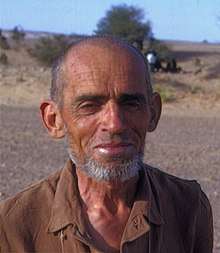Théodore Monod
Théodore André Monod (April 9, 1902 – November 22, 2000) was a French naturalist, explorer, and humanist scholar.
Théodore Monod | |
|---|---|
 | |
| Born | April 9, 1902 |
| Died | November 22, 2000 (aged 98) Versailles, Yvelines, France |
Exploration
Early in his career, Monod was made professor at the Muséum national d'histoire naturelle and founded the Institut fondamental d’Afrique noire in Senegal. He became a member of the Académie des sciences d'outre-mer in 1949, member of the Académie de marine in 1957 and member of the Académie des sciences in 1963. In 1960 he was one of the founders of the World Academy of Art and Science.
He began his career in Africa with the study of monk seals on Mauritania's Cap Blanc peninsula. However, he soon turned his attention to the Sahara desert, which he would survey for more than sixty years in search of meteorites. Though he failed to find the meteorite he sought, he discovered numerous plant species as well as several important Neolithic sites. Perhaps his most important find (together with Wladimir Besnard) was the Asselar man, a 6,000-year-old skeleton of the Adrar des Ifoghas that many scholars believe to be the first remains of a distinctly black person. In the early 1960s he discovered the caravan wreck site at Ma'adin Ijafen.[1][2]
Private life and activism
Monod, the son of Wilfred Monod, attended the Lycée Pierre Corneille in Rouen.[3] His father was a pastor of l'Oratoire du Louvre, which Theodore also attended. He subsequently became the founding president of the Francophone Unitarian Association (1986-1990), the first openly Unitarian religious organization established in France and later sponsored a spin-off of the AUF known as the Fraternal Assembly of Christian Unitarians.
Monod was also politically active, taking part in pacifist and antinuclear protests until only some months before his death. He wrote several articles and books that adumbrated the emerging environmentalist movement. He described himself as a Christian anarchist.[4]
In 1970, he led an International Committee for the Defence of Ernest Ouandié during his trial. The Cameroonian revolutionary will be executed on the orders of the regime.
Monod was the great-grandson of Frédéric Monod. He shared a common ancestor with biologist Jacques Monod, the musician Jacques-Louis Monod, the politician Jérôme Monod and director Jean-Luc Godard.
Scientific work
The scientific bibliography of Théodore Monod includes more than 700 works on topics from his thesis subject, the Gnathiidae (a family of parasitic Isopoda), to the subject that he held close to his heart until his death: the Scaridae, which he published on in 1994 in collaboration with Canadian research scientist Andrea Bullock.
Selected works
Works re-edited and released by Actes Sud (Arles):
- Méharées, (Paris, 1937), rééd. 1989.
- L'Émeraude des garamantes, (éditions de L'Harmattan, Paris, 1984), rééd. 1992.
- L'Hippopotame et le philosophe, rééd. 1993.
- Désert lybique, éditions Arthaud, 1994.
- Majâbat Al-Koubrâ, Actes Sud, 1996.
- Maxence au désert, Actes Sud, Arles, 1995.
- Tais-toi et marche ..., exploration journal from El Ghallaouya-Aratane-Chinguetti, Actes Sud, 2002.
Awards
- 1960 Patrons's Medal of the Royal Geographical Society for his work in the Sahara. [5]
Authority name
References
- This article began as a translation of the corresponding article at the French Wikipedia, accessed 17 December 2005.
- Herbert, Eugenia W. (2003). Red Gold of Africa: Copper in Precolonial History and Culture. Univ of Wisconsin Press. ISBN 9780299096045.
- Christie, A. C.; Haour, A. (2018-08-01). "The 'Lost Caravan' of Ma'den Ijafen Revisited: Re-appraising Its Cargo of Cowries, a Medieval Global Commodity". doi:10.1163/21915784-20180008. Cite journal requires
|journal=(help) - Lycée Pierre Corneille de Rouen - History
- "Theodore Monod obituary". The Daily Telegraph. London. 24 November 2000.
- "List of Past Gold Medal Winners" (PDF). Royal Geographical Society. Retrieved 24 August 2015.
- IPNI. Monod.
External links
| Wikimedia Commons has media related to Théodore Monod. |
- Obituary at monachus-guardian.org
- webAfriqa — Théodore Monod, fondateur-directeur de l'IFAN
- Théodore Monod (French language)
- "Un exceptionel naturtaliste eclectique", Autres Temps, 2001, vol. 70 issue 70, pp. 25–38